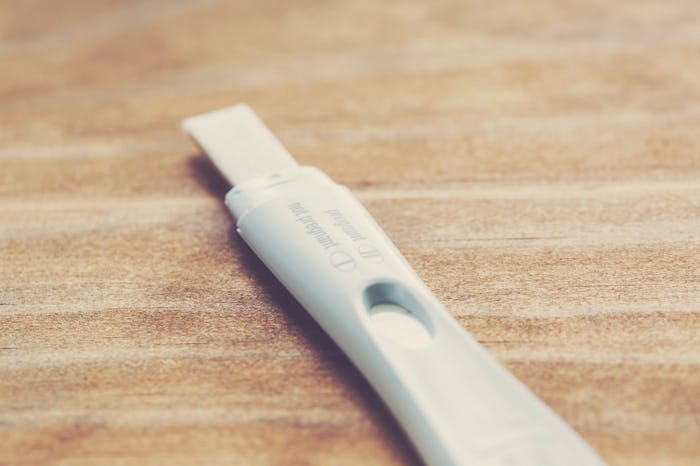Life

This HCG Level Calculator Should Be On Every TTC Woman's Wish List
If you've done any amount of research into the very early stages of pregnancy, you've probably know the human chorionic gonadotropin (hcG) is the key to a successful start to your pregnancy. If you've had any trouble getting pregnant, or are undergoing fertility treatment, you might know the feeling that inevitably follows the first few days after a positive pregnancy test; you're grasping for any piece of positive information that will indicate the pregnancy will progress. If you're going through fertility treatments and trying to calculate how quickly your hCG is increasing, you want to know which hCG level calculator is the best so that you can experience the reassurance you're looking for.
As it turns out, most hCG level calculators are very similar, so whatever one you turn to (like this one, this one or this one) should give you the same information about your hCG levels. You'll need to plug in the results of your two beta hCG blood tests, according to Healthline, including what time they were taken and how many days past your latest cycle of ovulation you are. Then the hCG level calculator will tell you if your numbers are doubling as quickly as they should and, as a result, your pregnancy is progressing.
According to BabyMed, a site devoted to all things pregnancy and baby, "In most normal pregnancies at an hCG level below 1,200 mIU/ml the hCG usually doubles every 48-72 hours. At levels below 6,000 mIU/ml the hCG levels normally increase by at least 60 percent every two to three days." If that sounds like gibberish to you, you can relax (and know that you're not alone, because science is complicated). Your blood tests results will come with those numbers, and you'll quickly be an expert in all of those numbers if you've been undergoing fertility treatment and/or have been attempting to get pregnant for some time.
So, what is hCG and why is it so important that we might need to calculate it? It causes those initial symptoms of early pregnancy, like breast tenderness, feeling emotional, nausea, and fatigue. Huggies explains further, stating the following:
"hCG levels rise consistently until around 10-12 weeks of gestation and then they tend to plateau, or even drop off. This is why in the first trimester (3 months) of pregnancy symptoms can be so much stronger and intense."
hCG is also the gauge for whether your pregnancy is likely to be and stay viable. If you have undergone fertility treatment, your hCG levels will be checked frequently to ascertain whether your pregnancy is headed in the right direction. If your hCG levels do not continue to double as they should, according to BabyCenter, it can be an indication that your pregnancy will not be viable and that you might be headed toward a miscarriage.
A slower rise in hCG levels can indicate a problem with the pregnancy. BabyMed explains further, reporting the following:
"Slower than expected hCG increases are more consistent with abnormal pregnancies such as miscarriages and ectopic pregnancies, and decreases are usually associated with failed pregnancies such as miscarriages or chemical pregnancies."
And that is exactly why you might want to keep a close eye on hCG levels if you have been undergoing fertility treatments such as intrauterine insemination or in vitro fertilization.
The funny thing about hCG is that if you have an unassisted pregnancy, you might go through your entire first trimester without worrying about hCG levels at all. Your doctor will likely check it, but it might not be cause for even mentioning if your numbers are where they should be for your gestational age. In fact, unless you are earlier in your pregnancy than six or seven weeks, hCG isn't even the best indicator of a healthy pregnancy. BabyMed breaks it down, citing: "In general, after six to seven weeks of the pregnancy the best indication of a healthy pregnancy is a good fetal heartbeat. Blood hCG levels are not very helpful to test for the viability of the pregnancy if the hCG level is well over 6,000 and/or after six to seven weeks of the pregnancy."
So, if you're going through fertility treatments, chat with your doctor about your hCG levels so you fully understand what they mean for you and your pregnancy.
Watch Romper's new video series, Romper's Doula Diaries:
Check out the entire Romper's Doula Diaries series and other videos on Facebook and the Bustle app across Apple TV, Roku, and Amazon Fire TV.